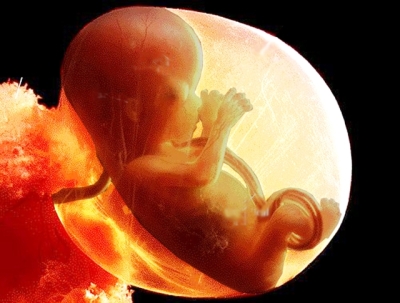
Dr. Michael Brown
The story is gut-wrenching and needs to be heard. A newly married woman is thrilled to be pregnant with her first child — a girl — only to hear from the doctor at 21 weeks that her precious child has severe spina bifida. The doctor recommends abortion, the mother and father agree, and with deep emotional agony, the mother aborts her child. Was it justifiable?
This was the story of Jennifer Gorman, who spoke of this tragic and difficult ordeal in her Huffington Post article, “Here’s What I Want Donald Trump And Everyone Else To Know About My ‘Late-Term Abortion.’”
A Late-Term Abortion
Here’s how she describes the moment the doctor gave them the shocking news:
“Her spinal cord was completely exposed just below her skull. I remember immediately starting to cry and my ears started to ring so loudly I could barely hear her as she continued to speak. I struggled to listen as she explained in detail what we were facing.
The doctor told us that it was unlikely that our baby would survive and should she make it to delivery and live, she would be paralyzed from the neck down. She would be confined to a wheelchair and would likely be permanently attached to a colostomy bag and feeding tube; she would be profoundly mentally disabled. The doctor advised us that our best course of action, in her medical opinion, was a therapeutic abortion, and with heavy hearts we agreed.
Personally, I’m glad she wrote this article, reminding us of how gut-wrenching the choice of abortion can be for many.
It was hardly something cavalier, like an easy way to deal with an unwanted pregnancy due to a sexual fling or a calloused attempt to remove an unexpected “career obstacle.”
Not at all. As Gorman writes, when the abortion “was done, I awoke to the sound of my own sobs. I cried every day after for six months” — from grief, she emphasizes, not guilt.
No Condemnation
Shall we who are pro-life condemn her and her husband for their decision?
I cannot see how, as much as we disagree with it. I cannot claim such high moral ground, having never been faced with the situation in my own life.
But we can ask questions, starting with the most obvious: If it would be wrong to take the baby out of its suffering at the age of one week or one year or five years, why would it be right to terminate its suffering in the womb? What is the fundamental difference?
Is Infanticide Wrong?
Advocates of infanticide, coming from the opposite perspective, actually agree with this line of reasoning. As expressed by the evolutionary biologist Jerry Coyne:
“If you are allowed to abort a fetus that has a severe genetic defect, microcephaly, spina bifida, or so on, then why aren’t you able to euthanize that same fetus just after it’s born?
“I see no substantive difference that would make the former act moral and the latter immoral. After all, newborn babies aren’t aware of death, aren’t nearly as sentient as an older child or adult, and have no rational faculties to make judgments (and if there’s severe mental disability, would never develop such faculties).”
Exactly so. If it’s moral to euthanize a severely handicapped baby before birth, why not after birth?
I also wonder why the Gormans’ doctor did not suggest the possibility of corrective surgery.
Michelle Blaire’s Story
A February 21, 2018 article on LifeNews.com announced, “Incredible Surgery in the Womb Corrects Baby’s Spina Bifida After Her Parents Reject Abortion.”
The article reports that, “During her pregnancy, Michelle Blaire said doctors diagnosed her unborn daughter with spina bifida myelomeningocele, the most severe form of the defect. Despite the dire diagnosis, abortion was never an option for us,’ she said” (speaking for herself and her husband Ben).
At 25 weeks, their daughter, Caroline, was operated on, and today, her father says, “She is just like any other little girl, but she is our miracle.”
An Option for Spina Bifida — and Other Disabilities
Was this not an option for the Gormans? If so, why wasn’t it presented to them?
To repeat: The last thing on my mind is to sit in judgment on this couple. I cannot imagine what they lived through and how they still suffer pain for their loss. And I understand they believe they made the right decision. But was it a fully informed decision?
A dear friend of mine who is a pastor told me this week, “There is a child in our fellowship who had an operation post-birth that marvelously corrected the spina bifida. She’s a delightful, active, alert child.”
And that leads me to the last and most important question.
Who is to determine what quality of life is acceptable?
Joy for Living
Daniel Ritchie tells his remarkable story:
“‘Do you want us to let him go?’
“Those were the first words that were spoken over me as I came into the world. Those were the words of my delivery room doctor as he held my armless and lifeless body in his arms. As he assessed me and my situation all he could tell my parents is that I was ‘not viable.’ His best-case scenario would be that even if I could somehow survive I would ‘never lead a full life.’”
I met Daniel last year at a conference and was amazed by his vibrancy of spirit, his zest for life, his joy.
And I’ll not soon forget watching him take an apple with his bare foot and bring it to his mouth, or hold the microphone between his toes during a panel discussion.
Yet he was almost allowed to die at birth. What does this tell us?
Who Plays God?
As always, the bottom-line issue is this: Should a child with Down Syndrome be brought into the world? A child without arms? A child who will be blind? Who gets to make this decision and play God?
To say it once more: I do not judge those who chose to have abortions after agonizing searching of heart, feeling they were making the best decision for their child and family. That’s between them and God.
But I do say this: It is always the best course to choose life, as much as it lies with us. However fragile and weak that life is, it is precious and of inestimable value.
SOURCE: Dr Michael Brown

